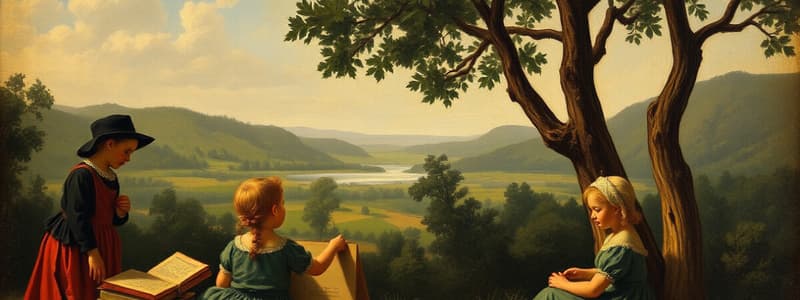Podcast
Questions and Answers
What was Martin Luther's primary contribution to early childhood education?
What was Martin Luther's primary contribution to early childhood education?
- He believed that education should start at the age of five.
- He introduced sensory education as a teaching method.
- He emphasized the importance of teaching children to read. (correct)
- He developed the first picture book for children.
What did John Amos Comenius believe about early childhood education?
What did John Amos Comenius believe about early childhood education?
- Education should begin in the teenage years.
- Young children should only learn through play.
- Education should start in the early years for effective learning. (correct)
- Learning is best achieved through memorization.
What is a key implication of Locke's belief in child development?
What is a key implication of Locke's belief in child development?
- Children's development is solely determined by their genetics.
- All children will achieve the same outcomes regardless of their environment.
- Environmental factors significantly influence differences in learning and behavior. (correct)
- The role of parents is minimal in child development.
How did John Locke's theory of the mind influence education?
How did John Locke's theory of the mind influence education?
What concept did Rousseau introduce related to children's education?
What concept did Rousseau introduce related to children's education?
What aspect of education did Comenius argue was essential for learning?
What aspect of education did Comenius argue was essential for learning?
What is the essence of developmentally appropriate practice as proposed by Rousseau?
What is the essence of developmentally appropriate practice as proposed by Rousseau?
What continuing relevance do Luther's ideas have in today's education system?
What continuing relevance do Luther's ideas have in today's education system?
What educational strategy did Pestalozzi develop to support learning?
What educational strategy did Pestalozzi develop to support learning?
How did Locke's views contribute to modern educational practices?
How did Locke's views contribute to modern educational practices?
Study Notes
Martin Luther
- Emphasized the need for schools to teach children to read, reshaping education during the Protestant Reformation.
- Advocated for reading the Bible in native languages, promoting universal education.
- Translated the Bible into German, enabling literacy and learning accessible to the populace.
- Today, literacy remains a priority, reflecting ongoing issues related to native language education.
John Amos Comenius
- Authored significant educational texts, including "The Great Didactic" and "Orbis Pictus," the first picture book for children.
- Advocated early education, likening it to nurturing a young plant that can be shaped before it becomes a tree.
- Highlighted the importance of sensory education, which influences modern educational practices, including Montessori methods.
- Current brain research supports early learning, validating Comenius's emphasis on developmental readiness.
John Locke
- Known for the concept of the mind as a "tabula rasa" (blank slate), emphasizing environmental influences on development.
- Suggested that children's experiences and parental stimulation are crucial for cognitive growth.
- Modern educational practices reflect Locke's ideas, focusing on early education to address achievement gaps related to socioeconomic conditions.
- Universal preschool programs aim to counteract negative childhood experiences associated with poverty.
Jean-Jacques Rousseau
- Best known for "Émile," advocating for natural education that allows children to grow without interference.
- Introduced the concept of "unfolding," where children's true nature develops naturally according to their innate timetable.
- Supports developmentally appropriate practices, ensuring educational methods align with children's developmental stages.
- Teachers make daily decisions to tailor their instruction to fit individual children's growth.
Johann Heinrich Pestalozzi
- Influenced by Comenius and Rousseau, Pestalozzi focused on education through sensory experiences.
- Developed "object lessons" to promote hands-on learning through activities like counting and measuring.
- Authored books, including "How Gertrude Teaches Her Children," aimed at guiding parents in teaching at home.
- The legacy of his teachings continues, as contemporary education emphasizes the importance of practical learning experiences.
Studying That Suits You
Use AI to generate personalized quizzes and flashcards to suit your learning preferences.
Description
Explore the contributions of famous historical figures to early childhood education. This quiz will cover key individuals and their teaching philosophies that have shaped educational practices. Gain insights into their lasting impact on how we understand and educate children today.




